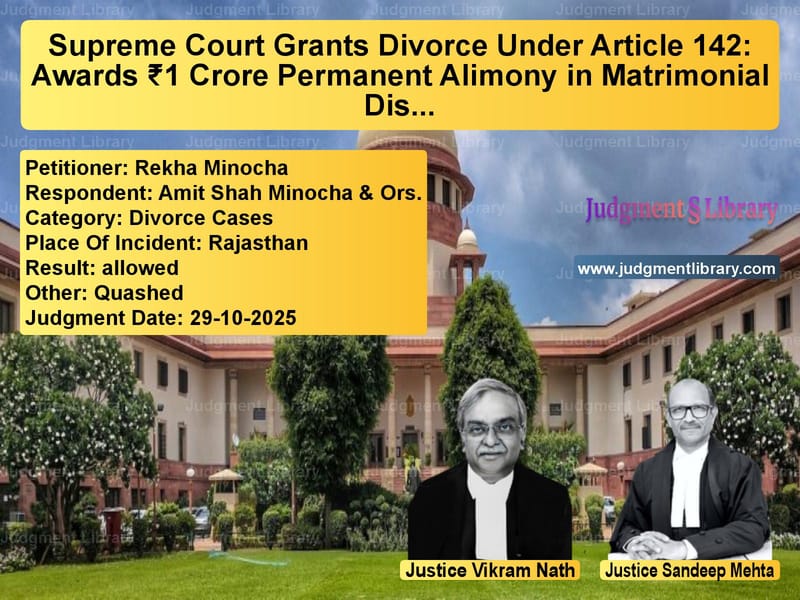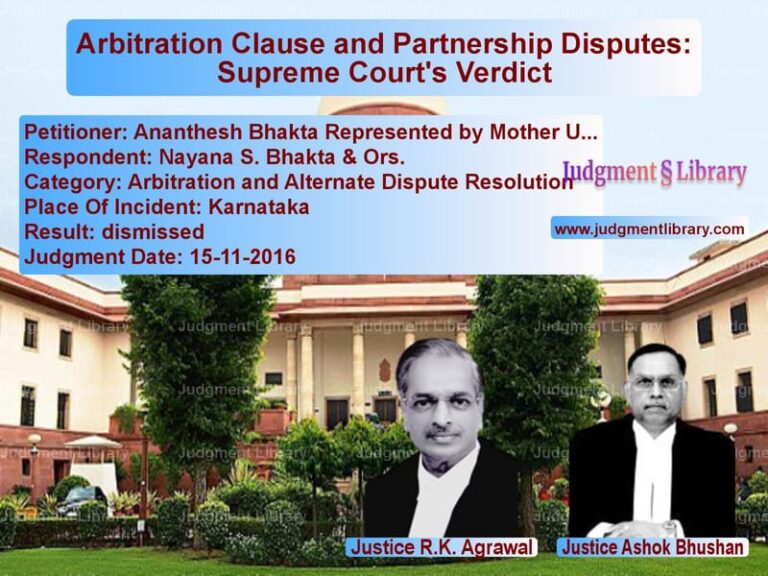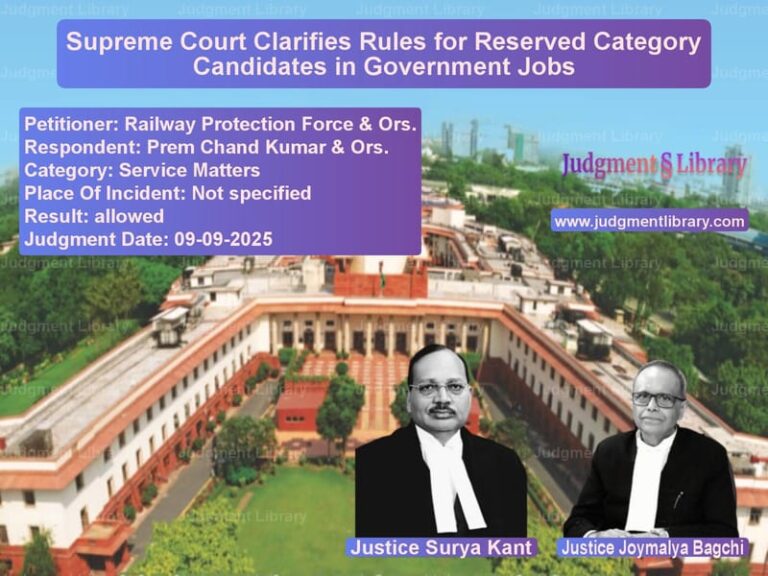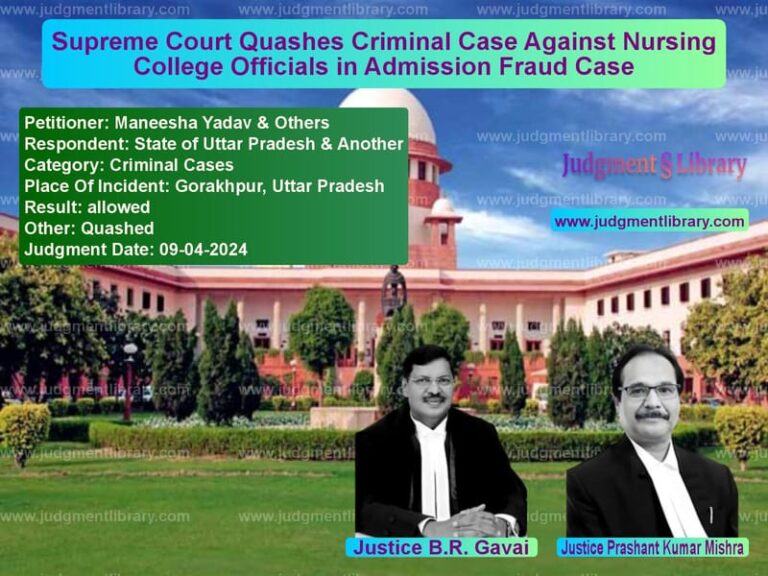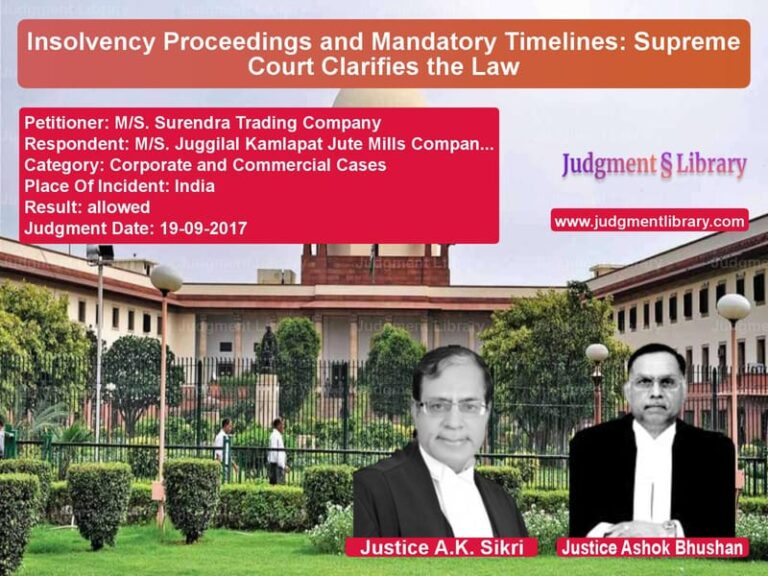Supreme Court Grants Divorce Under Article 142: Awards ₹1 Crore Permanent Alimony in Matrimonial Dispute
In a significant exercise of its extraordinary constitutional powers, the Supreme Court of India recently delivered a landmark judgment that brings closure to a protracted and acrimonious matrimonial dispute spanning over fifteen years. The case involved Rekha Minocha and Amit Shah Minocha, whose marriage had completely broken down, leading to multiple legal battles across various courts. The Supreme Court, recognizing the irretrievable breakdown of the marriage, invoked its powers under Article 142 of the Constitution to grant divorce and award a substantial settlement of ₹1 crore as permanent alimony to the wife. This judgment demonstrates the Court’s commitment to ensuring justice in matrimonial disputes where traditional legal remedies have failed to provide complete resolution.
The Long and Bitter Matrimonial Journey
The matrimonial dispute between Rekha Minocha and Amit Shah Minocha had its origins in a marriage solemnized on October 5, 2009. The relationship quickly deteriorated, with the appellant-wife alleging mental and physical harassment by her in-laws. This led to her leaving the matrimonial home on April 15, 2010, after just six months of marriage. While living at her parental home, the wife gave birth to their son on December 28, 2010, further complicating the already strained relationship between the parties.
The legal battles began in earnest on July 9, 2013, when the appellant-wife filed an application under Section 125 of the Code of Criminal Procedure, seeking maintenance for herself and their minor child. This was followed by another significant legal proceeding on January 16, 2019, when she filed an application under Section 12 of the Protection of Women from Domestic Violence Act, 2005. The Trial Court, in its order dated January 16, 2019, provided comprehensive relief to the wife, directing the husband to pay ₹5,000 per month for rent, water, and electricity expenses, ₹10,000 per month as maintenance for the appellant, ₹5,000 per month as maintenance for their minor child, and an additional ₹5,000 for the child’s education. The Court also granted custody of the minor child to the appellant-wife under Section 21 of the DV Act and awarded ₹4,00,000 as compensation for mental, emotional, and physical suffering under Section 22 of the DV Act.
The Appellate Proceedings and High Court Challenge
Both parties appealed against the Trial Court’s order. The appellant-wife filed Criminal Appeal No. 07 of 2019 seeking the right of residence in the shared household, while the respondent-husband filed Criminal Appeal No. 03 of 2019. The Appellate Court, vide order dated July 29, 2021, dismissed both appeals and upheld the Trial Court’s order.
Simultaneously, the Family Court in the Section 125 CrPC proceedings, through its order dated October 15, 2022, directed the respondent-husband to pay additional maintenance of ₹2,000 per month to the appellant-wife and ₹1,000 per month to their minor child, over and above the amounts awarded in the DV Act proceedings.
Aggrieved by these orders, both parties approached the High Court through revision petitions. The appellant-wife filed S.B. Criminal Revision Petition No. 950 of 2021, while the respondent-husband filed S.B. Criminal Revision Petition No. 813 of 2021 against the same order, and S.B. Criminal Revision Petition No. 2009 of 2022 against the Family Court’s order dated October 15, 2022. The High Court heard all these petitions together and delivered a consolidated judgment that significantly altered the relief granted to the wife.
The High Court dismissed the appellant-wife’s revision petition, allowed the husband’s revision petition against the Family Court’s order (thereby dismissing the wife’s application under Section 125 CrPC), and partially allowed the husband’s other revision petition by setting aside the compensation of ₹4,00,000 awarded under Section 22 of the DV Act.
The Supreme Court Proceedings and Settlement Efforts
Both parties approached the Supreme Court through special leave petitions. The respondent-husband’s SLP (Crl) No. 14187 of 2023 was dismissed by the Supreme Court on March 19, 2025. The Court took a proactive approach in dealing with the matter, passing several orders directing the respondent-husband to clear outstanding maintenance arrears due to the appellant-wife and their minor child. The husband complied with these directions by submitting bank drafts before the Court.
A significant development occurred when, during the proceedings, the respondent-husband through his counsel made a statement that “over and above what has already been paid by the respondent to the appellant, the respondent is ready to pay additional amount of Rs.1,00,00,000/-(Rupees one crore only) as permanent alimony and for settlement of all pending dues for the appellant-wife and the son.” This offer marked a turning point in the long-standing dispute and opened the possibility for a comprehensive settlement.
The Supreme Court’s Exercise of Article 142 Powers
The Supreme Court bench comprising Justices Vikram Nath and Sandeep Mehta recognized that this was a fit case for exercising the Court’s extraordinary powers under Article 142 of the Constitution of India. Article 142 empowers the Supreme Court to pass any decree or order necessary for doing complete justice in any cause or matter pending before it.
The Court noted that “the relationship between the parties has irretrievably broken down. The parties have been living separately since 15 April 2010, more than fifteen years now. Further, even the attempt at reconciliation through the Supreme Court Mediation Centre did not yield any positive result. Years of acrimony and bitterness have defined their relationship, and despite the appellant-wife contesting the grant of divorce, we find that no marital bond survives between them.”
The Court powerfully observed that “In these circumstances, there is no purpose in perpetuating a legal relationship that has ceased to have any meaning. Therefore, we find this a fit case to grant a decree of divorce using our powers under Article 142 of the Constitution of India.”
The Comprehensive Settlement and Final Order
The Supreme Court accepted the husband’s offer of ₹1 crore as permanent alimony, noting that “Upon a careful consideration of all relevant factors, including the income and financial standing of the parties, and other attendant circumstances, we find the amount of Rs.1,00,00,000/- (Rupees one crore only) to be a just, fair and reasonable amount as permanent alimony and towards all pending dues.”
The Court made it clear that “This amount shall be treated as a full and final settlement of all claims between the parties including those of the minor child represented by his guardian mother i.e. the appellant Rekha Minocha, and upon receipt thereof neither party shall raise any further claim against the other.” However, the Court specifically clarified that “this shall not preclude the respondent father from contributing for the child’s education.”
In its final operative directions, the Court ordered that “All pending proceedings, civil or criminal, arising out of this marriage, shall by virtue of this order, stand quashed and closed.”
The Court formally dissolved the marriage between the parties, subject to the condition that the respondent-husband shall pay the sum of ₹1,00,00,000 to the appellant-wife as permanent alimony and full and final settlement of all claims within three months. The decree was to be drawn up upon the Registry being furnished with proof of payment.
Legal Significance and Broader Implications
This judgment represents a significant example of the Supreme Court’s use of Article 142 powers to achieve complete justice in matrimonial disputes where the marriage has irretrievably broken down. The Court’s approach demonstrates several important legal principles:
First, it reaffirms that in cases where marriages have completely broken down with no possibility of reconciliation, continuing the legal fiction of marriage serves no purpose. The Court’s willingness to grant divorce under Article 142 in such circumstances ensures that parties are not trapped in legal relationships that have ceased to exist in reality.
Second, the judgment shows the Court’s commitment to ensuring that financial settlements in matrimonial disputes are substantial and meaningful, reflecting the contemporary economic realities and ensuring that the financially weaker spouse, typically the wife, is adequately provided for.
Third, the Court’s approach of bringing a comprehensive end to all pending litigation between the parties through a single settlement prevents further legal battles and allows both parties to move forward with their lives.
Fourth, the judgment balances the interests of all stakeholders, including the child, by ensuring adequate financial provision while keeping the door open for the father to contribute to the child’s education beyond the settlement amount.
This landmark judgment serves as an important precedent for dealing with long-standing matrimonial disputes where traditional legal remedies have failed to provide complete resolution. It demonstrates the Supreme Court’s role as not just an interpreter of law but as an institution committed to achieving substantive justice in individual cases, particularly in sensitive matters involving family relationships and women’s rights.
Petitioner Name: Rekha Minocha.Respondent Name: Amit Shah Minocha & Ors..Judgment By: Justice Vikram Nath, Justice Sandeep Mehta.Place Of Incident: Rajasthan.Judgment Date: 29-10-2025.Result: allowed.
Don’t miss out on the full details! Download the complete judgment in PDF format below and gain valuable insights instantly!
Download Judgment: rekha-minocha-vs-amit-shah-minocha-&-supreme-court-of-india-judgment-dated-29-10-2025.pdf
Directly Download Judgment: Directly download this Judgment
See all petitions in Alimony and Maintenance
See all petitions in Child Custody
See all petitions in Domestic Violence
See all petitions in Mutual Consent Divorce
See all petitions in Property Division in Divorce Cases
See all petitions in Judgment by Vikram Nath
See all petitions in Judgment by Sandeep Mehta
See all petitions in allowed
See all petitions in Quashed
See all petitions in supreme court of India judgments October 2025
See all petitions in 2025 judgments
See all posts in Divorce Cases Category
See all allowed petitions in Divorce Cases Category
See all Dismissed petitions in Divorce Cases Category
See all partially allowed petitions in Divorce Cases Category

